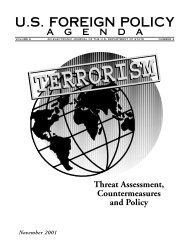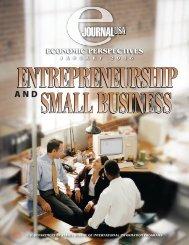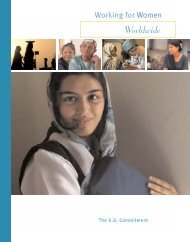s. history us history us history - Embassy of the United States
s. history us history us history - Embassy of the United States
s. history us history us history - Embassy of the United States
- No tags were found...
Create successful ePaper yourself
Turn your PDF publications into a flip-book with our unique Google optimized e-Paper software.
CHAPTER 3: THE ROAD TO INDEPENDENCEOUTLINE OF U.S. HISTORYWhen c<strong>us</strong>toms <strong>of</strong>ficials sought tocollect duties, <strong>the</strong>y were set upon by<strong>the</strong> populace and roughly handled.For this infraction, two British regimentswere dispatched to protect <strong>the</strong>c<strong>us</strong>toms commissioners.The presence <strong>of</strong> British troops inBoston was a standing invitation todisorder. On March 5, 1770, antagonismbetween citizens and Britishsoldiers again flared into violence.What began as a harmless snowballing<strong>of</strong> British soldiers degeneratedinto a mob attack. Someone gave <strong>the</strong>order to fire. When <strong>the</strong> smoke hadcleared, three Bostonians lay dead in<strong>the</strong> snow. Dubbed <strong>the</strong> “Boston Massacre,”<strong>the</strong> incident was dramaticallypictured as pro<strong>of</strong> <strong>of</strong> British heartlessnessand tyranny.Faced with such opposition, Parliamentin 1770 opted for a strategicretreat and repealed all <strong>the</strong> Townshendduties except that on tea, whichwas a luxury item in <strong>the</strong> colonies,imbibed only by a very small minority.To most, <strong>the</strong> action <strong>of</strong> Parliamentsignified that <strong>the</strong> colonists had wona major concession, and <strong>the</strong> campaignagainst England was largelydropped. A colonial embargo on“English tea” continued but was nottoo scrupulo<strong>us</strong>ly observed. Prosperitywas increasing and most colonialleaders were willing to let <strong>the</strong> futuretake care <strong>of</strong> itself.SAMUEL ADAMSDuring a three-year interval <strong>of</strong>calm, a relatively small number <strong>of</strong>radicals strove energetically to keep<strong>the</strong> controversy alive. They contendedthat payment <strong>of</strong> <strong>the</strong> tax constitutedan acceptance <strong>of</strong> <strong>the</strong> principlethat Parliament had <strong>the</strong> right to ruleover <strong>the</strong> colonies. They feared that atany time in <strong>the</strong> future, <strong>the</strong> principle<strong>of</strong> parliamentary rule might be appliedwith devastating effect on allcolonial liberties.The radicals’ most effectiveleader was Samuel Adams <strong>of</strong> Massach<strong>us</strong>etts,who toiled tirelessly fora single end: independence. From<strong>the</strong> time he graduated from HarvardCollege in 1743, Adams was a publicservant in some capacity — inspector<strong>of</strong> chimneys, tax-collector, andmoderator <strong>of</strong> town meetings. Aconsistent failure in b<strong>us</strong>iness, he wasshrewd and able in politics, with <strong>the</strong>New England town meeting his <strong>the</strong>ater<strong>of</strong> action.Adams wanted to free peoplefrom <strong>the</strong>ir awe <strong>of</strong> social and politicalsuperiors, make <strong>the</strong>m aware <strong>of</strong><strong>the</strong>ir own power and importance,and th<strong>us</strong> aro<strong>us</strong>e <strong>the</strong>m to action. Toward<strong>the</strong>se objectives, he publishedarticles in newspapers and madespeeches in town meetings, instigatingresolutions that appealed to <strong>the</strong>colonists’ democratic impulses.In 1772 he induced <strong>the</strong> Bostontown meeting to select a “Committee<strong>of</strong> Correspondence” to state<strong>the</strong> rights and grievances <strong>of</strong> <strong>the</strong>colonists. The committee opposeda British decision to pay <strong>the</strong> salaries<strong>of</strong> judges from c<strong>us</strong>toms revenues; itfeared that <strong>the</strong> judges would no longerbe dependent on <strong>the</strong> legislaturefor <strong>the</strong>ir incomes and th<strong>us</strong> no longeraccountable to it, <strong>the</strong>reby leading to<strong>the</strong> emergence <strong>of</strong> “a despotic form<strong>of</strong> government.” The committeecommunicated with o<strong>the</strong>r towns onthis matter and requested <strong>the</strong>m todraft replies. Committees were setup in virtually all <strong>the</strong> colonies, andout <strong>of</strong> <strong>the</strong>m grew a base <strong>of</strong> effectiverevolutionary organizations. Still,Adams did not have enough fuel toset a fire.THE BOSTON “TEA PARTY”In 1773, however, Britain furnishedAdams and his allies with an incendiaryissue. The powerful East IndiaCompany, finding itself in critical financialstraits, appealed to <strong>the</strong> Britishgovernment, which granted it amonopoly on all tea exported to <strong>the</strong>colonies. The government also permitted<strong>the</strong> East India Company tosupply retailers directly, bypassingcolonial wholesalers. By <strong>the</strong>n, most<strong>of</strong> <strong>the</strong> tea consumed in America wasimported illegally, duty-free. By sellingits tea through its own agents ata price well under <strong>the</strong> c<strong>us</strong>tomaryone, <strong>the</strong> East India Company madesmuggling unpr<strong>of</strong>itable and threatenedto eliminate <strong>the</strong> independentcolonial merchants. Aro<strong>us</strong>ed notonly by <strong>the</strong> loss <strong>of</strong> <strong>the</strong> tea trade butalso by <strong>the</strong> monopolistic practiceinvolved, colonial traders joined <strong>the</strong>radicals agitating for independence.In ports up and down <strong>the</strong> Atlanticcoast, agents <strong>of</strong> <strong>the</strong> East IndiaCompany were forced to resign.New shipments <strong>of</strong> tea were ei<strong>the</strong>rreturned to England or wareho<strong>us</strong>ed.In Boston, however, <strong>the</strong> agents defied<strong>the</strong> colonists; with <strong>the</strong> support<strong>of</strong> <strong>the</strong> royal governor, <strong>the</strong>y madepreparations to land incoming cargoesregardless <strong>of</strong> opposition. On<strong>the</strong> night <strong>of</strong> December 16, 1773, aband <strong>of</strong> men disguised as MohawkIndians and led by Samuel Adamsboarded three British ships lying atanchor and dumped <strong>the</strong>ir tea cargointo Boston harbor. Doubting <strong>the</strong>ircountrymen’s commitment to principle,<strong>the</strong>y feared that if <strong>the</strong> tea werelanded, colonists would actuallypurchase <strong>the</strong> tea and pay <strong>the</strong> tax.A crisis now confronted Britain.The East India Company had carriedout a parliamentary statute. If<strong>the</strong> destruction <strong>of</strong> <strong>the</strong> tea went unpunished,Parliament would admitto <strong>the</strong> world that it had no controlover <strong>the</strong> colonies. Official opinionin Britain almost unanimo<strong>us</strong>ly condemned<strong>the</strong> Boston Tea Party as anact <strong>of</strong> vandalism and advocated legalmeasures to bring <strong>the</strong> insurgentcolonists into line.THE COERCIVE ACTSParliament responded with newlaws that <strong>the</strong> colonists called <strong>the</strong>“Coercive” or “Intolerable Acts.” Thefirst, <strong>the</strong> Boston Port Bill, closed<strong>the</strong> port <strong>of</strong> Boston until <strong>the</strong> tea waspaid for. The action threatened <strong>the</strong>very life <strong>of</strong> <strong>the</strong> city, for to preventBoston from having access to <strong>the</strong>sea meant economic disaster. O<strong>the</strong>renactments restricted local authorityand banned most town meetingsheld without <strong>the</strong> governor’s consent.5657












